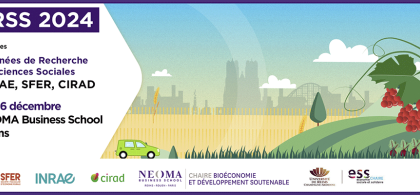
The ecological transition: what we learned from the 18th Social Sciences Research Day
In December, the Chair in Bioeconomy and Sustainable Development at NEOMA jointly organised the 18th Social Sciences Research Day (JRSS) on the Reims campus. The main themes this year were: agricultural production, the environment and the management of natural resources. Here we highlight major challenges and proposed solutions.
The ecological transition in viticulture
How is viticulture managing its transition? The Champagne Committee, for example, is encouraging sustainable practices to preserve terroirs and reduce the carbon footprint of the sector. This approach includes reducing the use of pesticides, promoting biodiversity and adopting cultivation techniques that respect the soil. At the same time, organic viticulture prohibits the use of synthetic chemical products.
What impact has this had on the quality of the wines? The wines express their terroir more faithfully, meeting the growing expectations of consumers for authentic products that respect the environment.
What are the benefits? These organic practices encourage the healthy life of the soil and vines that are more resistant to disease. In the end, this transition is an opportunity to combine economic performance, product quality and environmental responsibility.
The ecological transition in the agrifood sector
What are the challenges? Traditional meat production is a major source of greenhouse gas emissions. It requires considerable resources, especially in water, fertilisers and agricultural land, but also a lot more pesticides.
What’s the alternative? The agrifood sector is increasingly developing substitutes for meat proteins. Plant-based alternatives, such as legumes, cereals and soya-based products, require fewer resources and generate a lower carbon footprint.
And the benefits to consumers? In addition, these substitutes are often richer in fibre and contain less saturated fat, thereby contributing to a healthier diet.
Adopting alternative proteins also fits within a sustainable development approach, meeting current environmental issues while satisfying the nutritional requirements of consumers.
The ecological transition and water management
What are the challenges? More and more French regions are experiencing periods of intense drought under the effects of climate change and the over-exploitation of water resources. For example, in 2022 France had its driest summer since 1959, with water restrictions affecting 93 departments and water table levels decreasing significantly. These phenomena threaten access to drinking water, increase pressure on agricultural and industrial use and emphasise conflicts of use between sectors. Managing water in a sustainable way has become a major challenge for regions, requiring approaches that combine innovation, storage and the reuse of water.
And what are the solutions? Pilot projects in the reuse of wastewater are o ngoing and reveal a real complexity of implementation (technical, financial, social acceptability and regulatory). However, nothing will happen without the raising of awareness and collective education in responsible water consumption. Initiatives such as the Eco-gestes Eau programme encourage individuals and businesses to reduce their consumption and the 2023 National Water Plan aims for a 10% reduction in consumption by 2030. Within this context, communities, businesses and individuals must act together to safeguard our water resources and adapt our regions to the ecological transition.
Water is no longer an inexhaustible resource, but a common asset which requires shared governance and innovative management, otherwise the tensions related to water access will only be exacerbated in future years.


